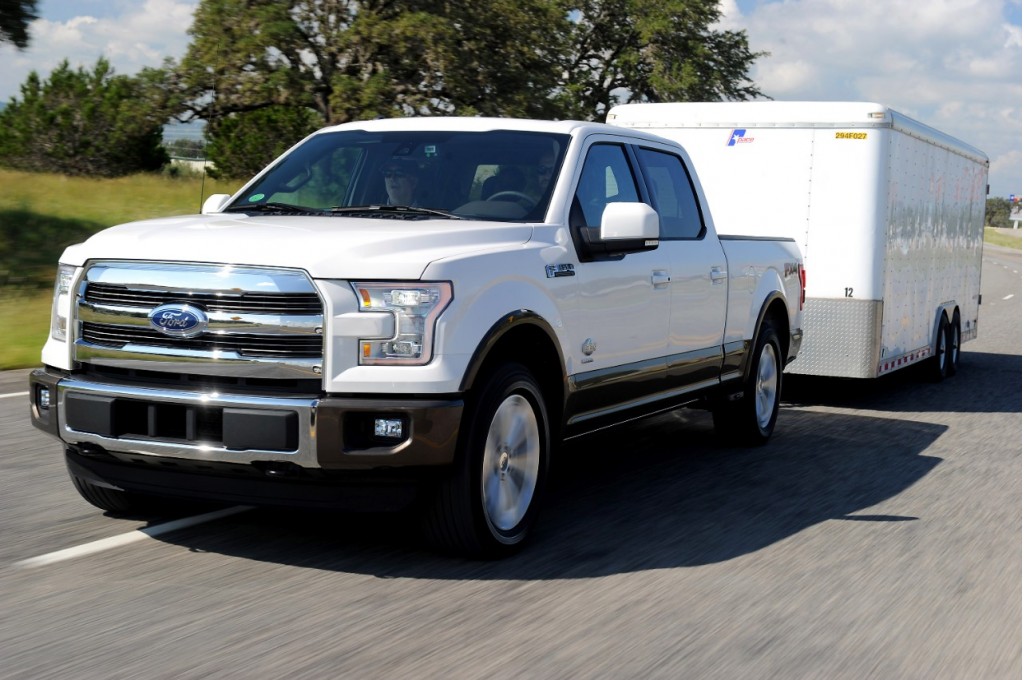The weight savings afforded by its aluminum body, the 2015 Ford F-150 isn't quite the most fuel-efficient full-size pickup truck, as measured by EPA ratings.
But how does the F-150 compare to other trucks in terms of lifetime carbon footprint?
DON'T MISS: Electric Car Life-Cycle Analysis: Renault Fluence ZE Vs Diesel, Gas Models
From that perspective, the 2015 F-150 leads the full-size truck pack, according to a new study from research firm Automotive Science Group (ASG).
Basing results on a Crew Cab body with the 2.7-liter turbocharged EcoBoost V-6--the most efficient engine available--researchers calculated that the F-150 has the lowest environmental impact of any pickup when manufacturing and a lifetime of use are factored in.

2015 Ford F-150
That's despite an anticipated higher level of emissions due to materials sourcing, component manufacturing, and assembly--which accounted for about 10 percent of the F-150's estimated total.
Fuel economy vs emissions
ASG also argues that in the long run, a 2.7-liter EcoBoost F-150 will prove better for the environment than the truck that beats it in EPA-rated fuel economy--the 2015 Ram 1500 EcoDiesel.
MORE: Mercedes B-Class Electric Car Cuts Lifetime Carbon Emissions Up To 64 Percent
The F-150 is rated at 22 mpg combined (19 mpg city, 26 mpg highway).
That compares to 23 mpg combined (20 mpg city, 28 mpg highway) for the standard rear-wheel-drive diesel Ram, and 24 mpg combined (21 mpg city, 29 mpg highway) for a new 2015 Ram 1500 EcoDiesel HFE model announced two weeks ago.
Researchers claim the small gap in fuel efficiency is cancelled out by the higher level of CO2 emissions from the diesel Ram.

2015 Ford F-150
Indeed, the EPA estimates 439 grams per mile of CO2 emissions for the Ram, and a slightly lower 407 grams per mile for the F-150.
The results for the 2015 F-150 broadly echo those of a study, commissioned by Mercedes-Benz, that compared the carbon footprint of a B-Class Electric Drive to an internal-combustion B-Class.
That study also found that manufacturing-related emissions were higher for the greener model, but that a lifetime of zero-emission driving more than made up for it.
ALSO SEE: As Gas Mileage Rises, Energy To Make Cars Gets More Important
Manufacturing emissions more important
Meanwhile another study conducted by Volkswagen estimated manufacturing to account for 22 percent of the lifetime emissions of a Golf TDI BlueMotion diesel hatchback.
That's a higher percentage than for the F-150, reflecting the compact hatchback's very low fuel consumption on the gentler European test cycle with a smaller TDI diesel engine than is offered in the U.S.

2015 Ford F-150
Emissions related to energy use still account for the vast majority of vehicle's total carbon footprint, so drastically cutting--or eliminating--fossil-fuel consumption will have a major impact on overall emissions.
However, as vehicles get more efficient, the emissions related to building them will come to represent a bigger proportion of their lifetime environmental impact.
So while carmakers are working to meet tougher global fuel-efficiency standards, they'll likely have to cut energy consumption in the manufacturing process as well from here on out.
[Editor's Note: An earlier version of this article quoted fuel economy for the 2015 Ram 1500 EcoDiesel at 23 mpg combined (20 mpg city, 28 mpg highway). We have updated it to reflect the announcement earlier this month of a new EcoDiesel HFE version rated at 24 mpg combined (21 mpg city, 24 mpg combined). The ASG study likely used the earlier rating for the Ram EcoDiesel, however.]
_______________________________________________












